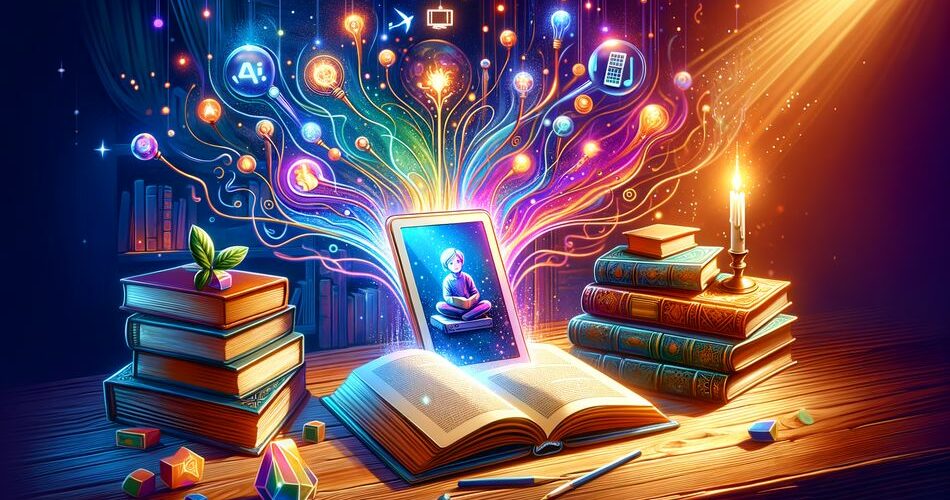In every culture, bedtime stories hold a special place in the hearts of both parents and children. These cherished narratives are more than just a whimsical diversion before the land of dreams; they are an essential part of child development, opening the doors to creativity, emotional learning, and linguistic skills. In today’s digital age, the ancient tradition of storytelling is undergoing an exciting transformation through the integration of Artificial Intelligence (AI).
The concept of AI bedtime stories brings together the warmth of traditional storytelling and the innovation of modern technology, offering a unique mechanism to ignite the imagination of young minds. In this blog post on Growing Together, let’s delve into how AI is reshaping bedtime stories and what this means for the future of parenting and child development.
The Magic of Bedtime Stories
Bedtime stories have long served as a potent educational tool. Through repeated storytelling sessions, children not only improve their vocabulary and comprehension but also learn valuable life lessons. The characters and plots in these stories often embody moral lessons, fostering a child’s emotional intelligence and empathy. Furthermore, the intimacy of a shared story creates a strong emotional bond between parent and child, making bedtime stories a treasured nightly ritual.
Enter AI: The Modern Storyteller
Artificial Intelligence is increasingly becoming a part of our daily lives, and its role in storytelling is no exception. Using AI, stories can be customized to suit the individual preferences and developmental stages of each child. These AI-driven narratives can be as interactive as a video game or as soothing as a traditional lullaby, offering an unparalleled experience in personalized storytelling.
By using algorithms to analyze a child’s age, interests, and even their emotional state, AI can craft stories that are specifically designed to resonate with that individual child. For instance, if a child is fascinated by space adventures, an AI program can generate a unique bedtime story that takes them on a cosmic journey, introducing educational elements about planets and stars along the way.
Benefits of AI Bedtime Stories
The integration of AI in bedtime storytelling comes with numerous benefits:
- Personalization: Each story can be tailor-made to fit the child’s mood, interests, and educational needs, ensuring maximum engagement and learning.
- Interactivity: Modern AI stories often include interactive elements that can engage children’s senses more fully, such as choosing the direction of the story or even integrating sound effects and visuals.
- Adaptive Learning: AI can monitor how a child responds to different story elements and adjust future narratives accordingly. This ensures that stories are not only enjoyable but also beneficial for cognitive and emotional development.
- Convenience: For busy parents, AI-generated bedtime stories can be a lifesaver, providing a reliable and enriching alternative when you are short on time.
Challenges and Considerations
While the benefits are compelling, it’s essential to approach AI bedtime stories with some caution. The primary concern is ensuring that technology enhances, rather than replaces, the parent-child bonding experience. AI should be viewed as a supplement to traditional storytelling rather than a replacement. Moreover, data privacy is a crucial factor, especially when dealing with children’s information. Parents should ensure that they’re using AI applications from reputable sources that comply with stringent privacy standards.
Bridging the Gap
To successfully combine tradition with technology, parents can adopt a hybrid approach. Use AI tools to create engaging and personalized stories but remain involved in the process. For instance, take turns with AI-generated narratives and traditional stories. Discuss the AI stories with your child, ask them questions, and encourage them to share their thoughts and feelings about what they’ve heard. This way, you can retain the emotional connection and educational benefits of storytelling.
Conclusion
The blend of AI and traditional storytelling offers a promising avenue for enhancing child development in today’s digital age. By leveraging the capabilities of AI, bedtime stories can become more personalized, interactive, and educational, enriching the lives of children and supporting their growth in myriad ways. As with any tool, the key is to use AI as a complement to, rather than a replacement for, the human touch that makes storytelling an enduring and cherished tradition.
At Growing Together, we believe that the future of parenting lies in thoughtful integration of technology into age-old practices. With the right balance, AI bedtime stories can become a magical addition to your family’s nightly routine, sparking imagination and fostering development in the most enchanting way possible.

